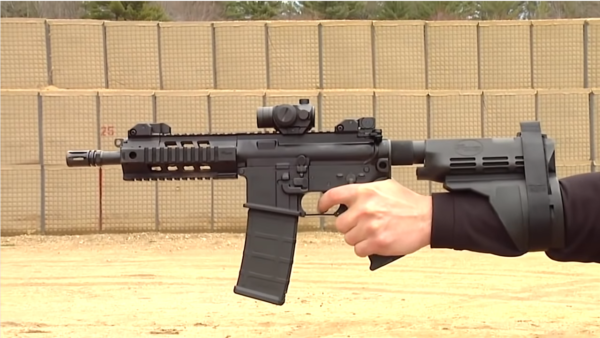
The Second Amendment Foundation has filed a federal lawsuit against the federal Bureau of Alcohol, Tobacco, Firearms and Explosives (ATF) alleging violations of the Administrative Procedures Act over what the gun rights organization calls ATF’s “flip-flop regulation of arm braces on semiautomatic pistols.”
An arm brace is a commonly-used accessory—more than 2 million are now in circulation, according to the 18-page SAF lawsuit—that helps shooters stabilize AR-15 pistols for one hand shooting. They were specifically developed to help disabled shooters fire such pistols.
The alleged problem is that some users apparently use these braces like buttstocks, firing the guns as short barreled rifles, which are regulated under the National Firearms Act.
SAF filed the legal action in U.S. District Court for the Northern District of Texas, Dallas Division. The case is known as SAF et. al. v. BATFE, et. al.
Also named as a defendant is the Department of Justice, along with acting ATF Director Regina Lombardo and Acting Attorney General Jeffrey Rosen. Those names could change quickly as the new Joe Biden administration takes over.
“There are several issues at play in this case,” said SAF founder and Executive Vice President Alan M. Gottlieb in a statement announcing the lawsuit. “It concerns the failure of the agencies and its officials to abide by long-established and Congressionally-mandated rulemaking requirements, threatening rights protected by the Second Amendment. This is especially important to disabled persons because these devices were originally developed to benefit shooters with physical disabilities.”
ATF had previously said arm braces were okay to use as accessories. But recently, the agency appears to have changed its opinion. That prompted a sharp rebuke from Gottlieb.
“BATF can’t just regulate an accessory like this and constantly leave people confused,” Gottlieb said. “We’re asking the court for an injunction to prevent this sort of thing from happening again.”
Plaintiffs are represented by attorneys Chad Flores, Hannah Roblyer and Daniel Nightingale at Beck Redden LLP in Houston, and Matthew Goldstein at Farhang & Medcoff in Tucson.